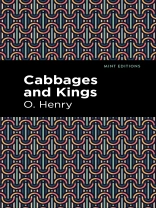Cabbages and Kings (1904) is a novel by American writer O. Henry. Inspired by his experiences as a fugitive in Honduras, the interconnected stories that make up Cabbages and Kings—the title refers to a line from Lewis Carroll’s Through the Looking Glass—address themes of revolution, imperialism, exploitation, and greed. The novel is significant not only for launching O. Henry’s career as a successful professional writer, but for coining the term “banana republic, ” now frequently used to describe the influence of American fruit companies over such nations as Honduras. In the fictional nation of Anchuria, the political reality and social life of its people are under attack—from within and without. An American businessman in the coastal town of Coralio receives a telegram from the capital city of San Mateo announcing that there has been a revolution. President Miraflores has fled to the coast, taking with him $100, 000 from the federal reserve. Sensing opportunity, Goodwin gathers a posse to hunt down the fugitive leader, tracking him to a nondescript inn in Coralio. Cornered, Miraflores kills himself, and Goodwin elopes with the President’s lover, taking the money with them. Although a liberal government has successfully risen to power, widespread corruption and deep poverty threaten to thrust Anchuria into further chaos. Cabbages and Kings is a collection of stories centered on this troubled tropical nation, where greed supersedes honor and the interests of the people are sold to the highest bidder. Despite or perhaps because of its critique of American influence in Latin America, Cabbages and Kings was a critical and commercial success for O. Henry, establishing his reputation as a master storyteller with a profound sense of right and wrong, and everything in between. This edition of O. Henry’s Cabbages and Kings is a classic of American literature reimagined for modern readers.
Since our inception in 2020, Mint Editions has kept sustainability and innovation at the forefront of our mission. Each and every Mint Edition title gets a fresh, professionally typeset manuscript and a dazzling new cover, all while maintaining the integrity of the original book.
With thousands of titles in our collection, we aim to spotlight diverse public domain works to help them find modern audiences. Mint Editions celebrates a breadth of literary works, curated from both canonical and overlooked classics from writers around the globe.
Om författaren
O. Henry (1862-1910) was an American short story writer. Born and raised in North Carolina, O. Henry—whose real name was William Sydney Porter—moved to Texas in 1882 in search of work. He met and married Athol Estes in Austin, where he became well known as a musician and socialite. In 1888, Athol gave birth to a son who died soon after, and in 1889 a daughter named Margaret was born. Porter began working as a teller and bookkeeper at the First National Bank of Austin in 1890 and was fired four years later and accused of embezzlement. Afterward, he began publishing a satirical weekly called The Rolling Stone, but in 1895 he was arrested in Houston following an audit of his former employer. While waiting to stand trial, Henry fled to Honduras, where he lived for six months before returning to Texas to surrender himself upon hearing of Athol’s declining health. She died in July of 1897 from tuberculosis, and Porter served three years at the Ohio Penitentiary before moving to Pittsburgh to care for his daughter. While in prison, he began publishing stories under the pseudonym “O. Henry, ” finding some success and launching a career that would blossom upon his release with such short stories as “The Gift of the Magi” (1905) and “The Ransom of Red Chief” (1907). He is recognized as one of America’s leading writers of short fiction, and the annual O. Henry Award—which has been won by such writers as William Faulkner, John Updike, and Eudora Welty—remains one of America’s most prestigious literary prizes.












